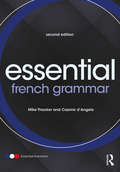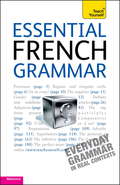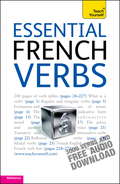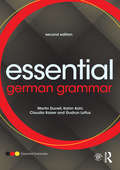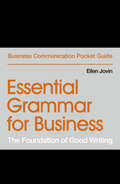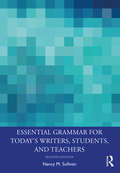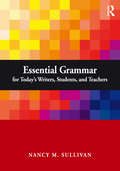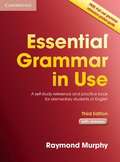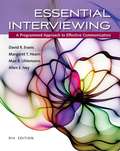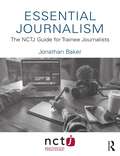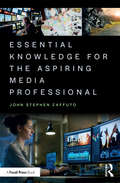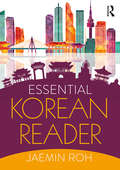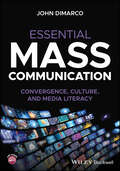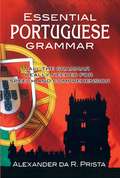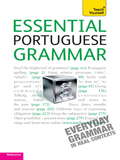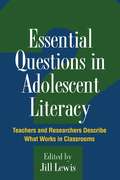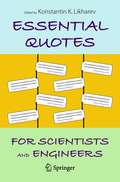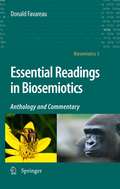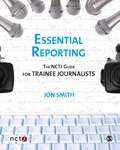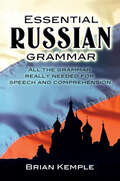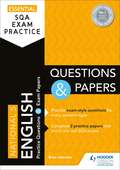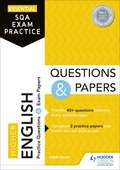- Table View
- List View
Essential French Grammar (Essential Language Grammars)
by Mike Thacker Casimir d'AngeloEssential French Grammar is a student-friendly French grammar designed to give learners a firm foundation on which to build a real understanding of both spoken and written French. Clear explanations of grammar are supported by contemporary examples, lively cartoon drawings and a variety of exercises. Key features of the second edition include: each grammar point explained initially with reference to English parallels between English and French provided where relevant 'Key points' box and tables that summarize grammar concepts real-life language examples in French, with English translations a variety of exercises to reinforce learning a contemporary primary source or literary extract to illustrate grammar in context more detailed coverage of punctuation, accents, spelling and the specific sounds of French This second edition includes an introductory chapter that describes the lexical and grammatical differences between French and English. A glossary of grammatical terms in French and English, useful verb tables, and a key to the exercises are also provided, making this an ideal resource for both independent and class-based learners. Essential French Grammar is an innovative reference grammar and workbook for intermediate and advanced undergraduate students of French. This text is ideal for students at CEFR levels B1 to C1, or Intermediate High to Advanced on the ACTFL scale.
Essential French Grammar: Teach Yourself
by Robin Adamson Brigitte EdelstonEssential French Grammar will help you get more out of your study of French. Essential French Grammar is an up-to-date introduction to French grammar. You don't need to know a lot about grammar before you start. Everything is explained simply and there are lots of examples to illustrate each point. Unlike more traditional grammars, Essential French Grammar is structured so that you can look up language forms according to what you want to say, even if you don't know the grammatical term for them. If you already know some grammar, then you can use the 'reference grammar' section at the back of the book to look up the points you need.The course consists of 18 units illustrating the various uses to which the language can be put, for example, giving instructions or talking about the recent past. The more traditional reference grammar deals with grammatical structures, such as the imperative or the perfect tense. All grammatical terms are explained in the glossary at the back of the book. Each unit contains exercises for you to practice what you have learnt and there is a key at the back of the book for you to check your answers. The new page design in this edition means that the book is even easier to use and the main headings are in English so that you can find your way around the book quickly. This edition contains a 'taking it further' section which will direct you to further sources of real French. Essential French Grammar will help you to understand and manipulate French grammar with confidence because:- you need no prior knowledge of grammatical terminology to use it;- the approach is accessible and supportive;- the examples are clear and in context;- exercises help you practise every point.Now in a brand new edition with new, easy-to-follow page design and interactive on-line features:NOT GOT MUCH TIME?One, five and ten-minute introductions to key principles to get you started.AUTHOR INSIGHTSLots of instant help with common problems and quick tips for success, based on the author's many years of experience.USEFUL VOCABULARYEasy to find and learn, to build a solid foundation for speaking.END-OF-UNIT SUMMARIES AND ONLINE TESTSSummaries and tests to help you keep track of your progress.EXTEND YOUR KNOWLEDGEExtra online articles at: www.teachyourself.com to give you a richer understanding of the culture and history of French.
Essential French Verbs: Teach Yourself
by Marie-Therese WestonEssential French Verbs is the course for you if you need help with your study of French. This fully revised edition of our best-selling course now comes with free downloadable audio support containing hints on how to learn verbs effectively.The aim of this book is to help you improve your command of French by focusing on one aspect of language learning that invariably causes difficulties - verbs and the way they behave.Whether you are a complete beginner or a relatively advanced learner, you can consult the book when you need to know the form of a verb quickly.The introductory section gives you a complete overview of French verbs and how they work in the various tenses.Essential French Verbs contains:- full coverage of the main tenses for 200 frequently used French verbs arranged alphabetically for quick and easy reference- examples of the verbs in everyday use, with colloquial expressions and words sharing the same origin- a French-English verb list of approximately 3000 verbs with details of the patterns they follow- an English-French verb list giving the most frequently used English verbs in French with details of the patterns they follow- free downloadable audio support with hints on how to learn verbsLearn effortlessly with a new, easy-to-read page design and interactive features:NOT GOT MUCH TIME?One, five and ten-minute introductions to key principles to get you started.AUTHOR INSIGHTSLots of instant help with common problems and quick tips for success, based on the author's many years of experience.USEFUL VOCABULARYEasy to find and learn, to build a solid foundation for speaking.ONLINE TESTSTests to help you keep track of your progress.EXTEND YOUR KNOWLEDGEExtra online articles at: www.teachyourself.com to give you a richer understanding of the culture and history of France.
Essential French Verbs: Teach Yourself
by Marie-Therese WestonEssential French Verbs is the course for you if you need help with your study of French. This fully revised edition of our best-selling course now comes with free downloadable audio support containing hints on how to learn verbs effectively.The aim of this book is to help you improve your command of French by focusing on one aspect of language learning that invariably causes difficulties - verbs and the way they behave.Whether you are a complete beginner or a relatively advanced learner, you can consult the book when you need to know the form of a verb quickly.The introductory section gives you a complete overview of French verbs and how they work in the various tenses.Essential French Verbs contains:- full coverage of the main tenses for 200 frequently used French verbs arranged alphabetically for quick and easy reference- examples of the verbs in everyday use, with colloquial expressions and words sharing the same origin- a French-English verb list of approximately 3000 verbs with details of the patterns they follow- an English-French verb list giving the most frequently used English verbs in French with details of the patterns they follow- free downloadable audio support with hints on how to learn verbsLearn effortlessly with a new, easy-to-read page design and interactive features:NOT GOT MUCH TIME?One, five and ten-minute introductions to key principles to get you started.AUTHOR INSIGHTSLots of instant help with common problems and quick tips for success, based on the author's many years of experience.USEFUL VOCABULARYEasy to find and learn, to build a solid foundation for speaking.ONLINE TESTSTests to help you keep track of your progress.EXTEND YOUR KNOWLEDGEExtra online articles at: www.teachyourself.com to give you a richer understanding of the culture and history of France.
Essential German Grammar (Essential Language Grammars)
by Martin Durrell Katrin Kohl Gudrun Loftus Claudia KaiserEssential German Grammar is a student-friendly grammar and workbook designed to give learners a firm foundation on which to build a real understanding of both spoken and written German. The reference grammar section offers clear explanations of key grammar points while a separate exercise section gives students the opportunity to test themselves and put into practice what they have learned. This new edition has been revised and updated throughout. Explanations, tables and exercises have been improved and a number of the authentic texts and illustrations have been replaced by new material. Key features of this second edition include: User-friendly layout with updated 2 colour design, engaging illustrations and visually appealing tables throughout to aid the learning process Clear and accessible explanations with memorable examples informed by the latest research on the German language and presented in accordance with current teaching methodology Helpful parallels between English and German provided where relevant End-of-chapter extracts taken from contemporary journalistic or authentic literary sources, illustrating grammar in context, with model translations provided at the back of the book Material to enable better strategic learning and understanding, including a Why Grammar?—FAQ section, a glossary of grammatical terms in both English and German and a complete answer key to exercises Created especially for the new edition, a companion website at www.routledge.com/cw/kaiser offering a wealth of additional materials, including interactive exercises, quizzes and flashcards to test student understanding, downloadable PDF sheets for classroom use, PowerPoint slides for instructors and audio recordings illustrating the sounds of spoken German. Written by highly experienced lecturers in the field, Essential German Grammar is an invaluable resource for intermediate and advanced students of German (CEFR levels A2 to B2, ACTFL Novice High to Intermediate High). It is designed to function equally as a free-standing grammar or as a foundation grammar for Hammer’s German Grammar and Usage and is suitable for both classroom use and self-study.
Essential Grammar for Business: The Foundation of Good Writing (Business Communication Pocket Guides)
by Ellen JovinReliable, authoritative, and designed to ease grammar anxiety!Words are the currency of every business transaction. They persuade, inspire, educate and clarify. Essential Grammar for Business offers guidance to professionals perplexed by proper comma placement, dangling modifiers or the difference between who and whom. With a better understanding of the building blocks, readers will be better equipped to focus on the other ingredients of good business writing such as content, clarity and style. This book is fun, fast-paced, and easy to use.
Essential Grammar for Today's Writers, Students, and Teachers
by Nancy M. SullivanThis innovative grammar text is an ideal resource for writers, language students, and classroom teachers who need an accessible refresher in a step-by-step guide to essential grammar. Rather than becoming mired in overly detailed linguistic definitions, Nancy Sullivan helps writers and students understand and apply grammatical concepts and develop the skills they need to enhance their writing. Along with engaging discussions of both contemporary and traditional terminology, Sullivan's text provides clear explanations of the basics of English grammar and a practical, hands-on approach to mastering the use of language. Complementing the focus on constructing excellent sentences, every example and exercise set is contextually grounded in language themes. This updated edition includes new sections in each chapter on Writing Matters (addressing key tools and concerns for writers) and Language Varieties (addressing issues of social and regional dialect variation). This is an ideal textbook for any writing course across disciplines where grammatical precision is important. Online resources including additional exercises, links, and an answer key are available at Routledge.com/9780367148683. Instructor materials accompanying the text provide teachers with activities designed for face-to-face, hybrid, and online instruction to enliven these basic grammar lessons as well as writing activities to integrate these concepts into students' own writing.
Essential Grammar for Today's Writers, Students, and Teachers
by Nancy SullivanThis innovative grammar text is an ideal resource for writers, language students, and current and future classroom teachers who need an accessible "refresher" in a step-by-step guide to essential grammar. Rather than becoming mired in overly detailed linguistic definitions, Nancy Sullivan helps writers and students understand and apply grammatical concepts and develop the skills they need to enhance their own writing. Along with engaging discussions of both contemporary and traditional terminology, Sullivan's text provides clear explanations of the basics of English grammar and a highly practical, hands-on approach to mastering the use of language. Complementing the focus on constructing excellent sentences, every example and exercise set is contextually grounded in language themes. Teachers, students, and writers will appreciate the streamlined, easy-to-understand coverage of essential grammar, as well as the affordable price. This is an ideal textbook for future teachers enrolled in an upper-level grammar course yet is also suitable for any writing course across disciplines where grammatical precision is important. Instructor materials accompanying the text provide teachers with activities designed for face-to-face, hybrid, and online instruction to enliven these basic grammar lessons as well as writing activities to integrate these concepts into students' own writing.
Essential Grammar in Use with Answers: A Self-study Reference and Practice Book for Elementary Students of English (3rd edition)
by Raymond MurphyAn absolute essential for any elementary level student. Essential Grammar in Use Third edition is a fully updated version of the bestselling grammar title. Now in full colour, with new content and even more exercises, this updated edition retains all the key features of clarity and ease-of-use that have made the book so popular with students and teachers. This edition, with answers, is ideal for self-study.
Essential Interviewing: A Programmed Approach to Effective Communication
by David R. Evans; Margaret T. Hearn; Max R. Uhlemann; Allen E. Ivey;This proven text gives you the tools you need to conduct successful interviews with diverse clients in a variety of professional settings, including social work, counseling, nursing, personnel work, and human services. With an emphasis on the three major stages of interviewing: exploration, clarification, and action.
Essential Journalism: The NCTJ Guide for Trainee Journalists
by Jonathan BakerThis book is a practical guide to all aspects of modern journalism for anyone seeking to study for the National Council for the Training of Journalists (NCTJ) Diploma in Journalism and become a qualified journalist in the UK. Written in collaboration with the NCTJ, Essential Journalism outlines everything you need to know about the journalism industry today, from its ethical framework to its practice across print, television, radio, online and social media. It looks at the core principles and the skills that are required of journalists across all platforms, helping students develop an overall understanding of the business and examining the application and adaptation of traditional best practice to the demands of the digital age. This is a unique one-stop shop for anyone who wants to understand the nature and purpose of journalism, and how it is changing and evolving in today’s digital newsrooms. This book is a core resource for journalism trainees and undergraduates, as well as for seasoned practitioners and lecturers.
Essential Knowledge for the Aspiring Media Professional
by John Stephen ZaffutoEssential Knowledge for the Aspiring Media Professional provides readers with the skillset needed to produce professional, high-quality video content in today’s competitive media landscape. The author draws on over two decades of industry experience to offer strategies for how to develop a sense of design, adopt a holistic approach to the media production process, and craft a distinct idea for a project’s intent and form. In five in-depth chapters, the book delves into topics ranging from pre-production and planning processes to technical considerations and post-production methods. It concludes with an overview of career opportunities for aspiring media-makers. This book is an invaluable resource for students and professionals alike looking to hone creative production techniques within a broad range of formats and environments, particularly those requiring effective marketing and advertising-oriented content.
Essential Korean Reader
by Jaemin RohFirst Published in 2017. Routledge is an imprint of Taylor & Francis, an Informa company.
Essential Linguistics: What Teachers Need To Know To Teach ESL, Reading, Spelling, And Grammar
by Yvonne S. Freeman David E. FreemanThe authors make the Second Edition more valuable by clearly explaining English phonology, morphology, and syntax and the implications for teaching, using the International Phonetic Alphabet to prepare students for the Praxis examination, including chapters on first and second language acquisition research and theories, reviewing ESL teaching methods. With examples, activities, and end-of-chapter applications that link linguistic theory and classroom practice, the authors show teachers how to use their new understandings of linguistics to help student learning.
Essential Literary Terms with Exercises
by Sharon HamiltonPrepare for AP placement in English literature with this volume of study, examples and exercises.
Essential Mass Communication: Convergence, Culture, and Media Literacy
by John DiMarcoHelps students develop the ability to analyze culture and utilize media literacy techniques, provides the core skills necessary to succeed in a communications career Essential Mass Communication helps students build a strong understanding of communication theory, mass communication technology, information studies, and mass communication practices. Offering an expanded view of the field, this comprehensive textbook combines easily accessible coverage of core skills and concepts with historically critical content on mass communication revolutions, cultural impacts, and converging media as they changed society. Throughout the text, author John DiMarco integrates professional practice components into each chapter, including professional pathways to applying mass communication to students' careers. Essential Mass Communication addresses a variety of creative fields, such as storytelling, rhetoric, journalism, marketing and advertising, design, fine art, photography, and filmmaking. Student-friendly chapters explore a uniquely wide range of topics, from introductory content on communication process and product to more in-depth discussion of game history and theory, critical theory, strategic communication, and more. Designed to help aspiring creative professionals learn and use the technology tools and channels available to deliver cultural and personal experiences in the form of media products, Essential Mass Communication: Introduces the concepts of mass communication and establishes foundations for understanding convergence and culture Provides the skills and knowledge required to apply critical media literacy analysis techniques in different fields Discusses the driving technologies, key people, convergence, and cultural instances of each mass communication media Covers the business and information disciplines of mass communication, including ethics and communication law Highlights the connection between communication technologies, culture, and careers in mass media Includes a wealth of real-world case studies, applied examples and assignments, key term definitions, end-of-chapter questions, in-text QR codes linking to internet sources, and valuable appendices for career development With a strong focus on creative, active learning, Essential Mass Communication: Convergence, Culture, and Media Literacy is the perfect textbook for undergraduate and graduate courses in Mass Communication, Information Studies, and Communication technologies, as well as relevant courses in Media Studies, International Communications, and Marketing, Advertising, and Public Relations programs.
Essential Portuguese Grammar
by Alexander Da PristaThis is the first Portuguese grammar designed specifically for adults with limited learning time, who have as their objective simple, everyday communication. The author covers the most important points of Portuguese grammar in the clearest possible way, concentrating upon the expressions that you would be most likely to use. All grammatical rules are illustrated with phrases and sentences that you can incorporate directly into your working vocabulary, and hints are generously sprinkled throughout, showing you how to replace difficult constructions with simpler ones.Constantly drawing comparisons with English construction, it presents in logical order all the major aspects of Portuguese grammar: word order, forming questions, nouns and articles, adjectives and adverbs, possessives, demonstrative adjectives and pronouns, how to form negatives, personal pronouns, conjunctions and prepositions, how to conjugate verbs in the major tenses, prepositions and infinitives, and so on.This grammar does not assume prior knowledge of either Portuguese grammar or of grammatical terms: one section is devoted to the definition of all grammatical terms used in the book.This is not a simplified study, but rather a selected grammar for adult use that points out many time-saving short cuts. It can be used alone either as a beginner or as a refresher course in Portuguese grammar or it can be an ideal supplement to a phrase book or record course for home study or class use. Contains four appendices covering regular conjugations, orthographic-changing verbs, and irregular verbs. Glossary of grammatical terms. Index.
Essential Portuguese Grammar: Teach Yourself
by Sue Tyson-WardEssential Portuguese Grammar will help you get more out of your study of Portuguese. Essential Portuguese Grammar is an up-to-date introduction to Portuguese grammar. You don't need to know a lot about grammar before you start. Everything is explained simply and there are lots of examples to illustrate each point. Unlike more traditional grammars, Essential Portuguese Grammar is structured so that you can look up language forms according to what you want to say, even if you don't know the grammatical term for them. If you already know some grammar, then you can use the 'reference grammar' section at the back of the book to look up the points you need.The course consists of 46 units illustrating the various uses to which the language can be put, for example, giving instructions or talking about the recent past. The more traditional reference grammar deals with grammatical structures, such as the imperative or the perfect tense. All grammatical terms are explained in the glossary at the back of the book. Each unit contains exercises for you to practise what you have learnt and there is a key at the back of the book for you to check your answers. The new page design in this edition means that the book is even easier to use and the main headings are in English so that you can find your way around the book quickly. This edition contains a 'taking it further' section which will direct you to further sources of real Portuguese. Essential Portuguese Grammar will help you to understand and manipulate Portuguese grammar with confidence because:- you need no prior knowledge of grammatical terminology to use it;- the approach is accessible and supportive;- the examples are clear and in context;- exercises help you practise every point.Now in a brand new edition with new, easy-to-follow page design:
Essential Questions in Adolescent Literacy
by Jill LewisIn each chapter of this unique volume, an exemplary teacher collaborates with a prominent scholar to present real-world strategies for putting literacy research to work in grades 5 12. These lively dialogues tackle key questions in adolescent literacy, including issues of motivation, critical thinking skills, content-area writing, differentiated instruction, assessment, English language learning, and technology. Suggestions for incorporating adolescents' out-of-school literacies and working with reading specialists and coaches show how to build connections between the classroom and wider communities. In-depth portraits of challenges and successes in the classroom, practical instructional tips, and stimulating questions for reflection make the book a valuable resource for in-service and preservice teachers.
Essential Quotes for Scientists and Engineers
by Konstantin K. LikharevThis book brings together about 2,500 quotations on various topics of interest to scientists and engineers, including students of STEM disciplines. Careful curation of the material by the editor provides the reader with far greater value than can be obtained by searching the internet.The quotes have been selected for various attributes including: importance of topic, depth of insight, and - not least - wit, with many of them satisfying all these criteria. To make sequential reading of the quotes more engaging, they are grouped into broad topical sections, and the entries within each section are organized thematically, forming quasi-continuous narrative threads. The text and authorship of each quote have been carefully verified, and the most popular cases of misquotation and misattribution are noted. The book represents a valuable resource for those writing science and engineering articles as well as being a joy to read in its own right.
Essential Readings in Biosemiotics
by Donald FavareauSynthesizing the findings from a wide range of disciplines - from biology and anthropology to philosophy and linguistics - the emerging field of Biosemiotics explores the highly complex phenomenon of sign processing in living systems. Seeking to advance a naturalistic understanding of the evolution and development of sign-dependent life processes, contemporary biosemiotic theory offers important new conceptual tools for the scientific understanding of mind and meaning, for the development of artificial intelligence, and for the ongoing research into the rich diversity of non-verbal human, animal and biological communication processes. Donald Favareau's Essential Readings in Biosemiotics has been designed as a single-source overview of the major works informing this new interdiscipline, and provides scholarly historical and analytical commentary on each of the texts presented. The first of its kind, this book constitutes a valuable resource to both bioscientists and to semioticians interested in this emerging new discipline, and can function as a primary textbook for students in biosemiotics, as well. Moreover, because of its inherently interdisciplinary nature and its focus on the 'big questions' of cognition, meaning and evolutionary biology, this volume should be of interest to anyone working in the fields of cognitive science, theoretical biology, philosophy of mind, evolutionary psychology, communication studies or the history and philosophy of science.
Essential Reporting: The NCTJ Guide for Trainee Journalists
by Jon Smith Joanne Butcher"If you want a book that instructs you about all the technical skills you need to pass the examinations set by the National Council for the Training of Journalists (NCTJ) and embark on a career in journalism, then this is the book for you. It outlines the basic knowledge required to succeed as a trainee reporter. Shorthand, intros, writing styles, subbing, layout, the way newsrooms work and how to find things out are among the range of skills described." - Times Higher Education "Precisely what it says on the cover - a down-to-earth essential handbook for anyone embarking on a career in journalism. All you need to know about avoiding newsroom minefields and attracting the editor′s attention for the right reasons. If only it had been around in my day!′ - Bob Satchwell, Executive Director, Society of Editors This is a book for everyone who wants to be a journalist: a practical guide to all you need to know, learn and do to succeed as a trainee reporter in today′s newsroom. Although the world of journalism is changing fast, as technology blurs the boundaries between newspapers, radio, television and web-based media, the reporter′s core role remains the same: to recognise news, communicate with people, gather information, and create accurate, balanced and readable stories. Essential Reporting, written by an experienced NCTJ examiner, explains how to do this. Contents include: what makes a good reporter what is news, and how to find it how newsrooms work day-to-day life as a reporter key reporting tasks covering courts and councils successful interviewing writing news stories specialist reporting handling sound, pictures and the web It also contains a wealth of advice, tips and warnings from working journalists, a guide to NCTJ training and examinations, a glossary and a guide to further reading. It will be invaluable to anyone embarking on a career in journalism and is the NCTJ′s recommended introductory text for all students on college and university courses preparing them to become successful reporters.
Essential Russian Grammar (Dover Language Guides Essential Grammar)
by Brian KempleDesigned for adults with limited learning time, this concise and easy-to-use guide enables language students to grasp the fundamentals of Russian quickly and easily. Focusing on the grammar needed to speak and understand the language, the text emphasizes comprehension rather than memorization of grammatical constructions.Author Brian Kemple uses an efficient and systematic approach to instructing students in the use of all the grammar that's needed for everyday speech and comprehension. Simple phrases are accompanied by clear explanations of parts of speech, use of the comparative and superlative degrees, word order, pronunciation, negation and more. A useful section of practical phrases and a glossary of grammatical terms round out this excellent, inexpensive guide.Perfect for independent study or as an adjunct to a language course, Essential Russian Grammar is ideal for students, business people, tourists or anyone planning to visit Russia.
Essential SQA Exam Practice: From the publisher of How to Pass
by Brian JohnstonExam board: SQALevel: National 5Subject: EnglishFirst teaching: September 2017First exam: Summer 2018Practice makes permanent. Feel confident and prepared for the SQA National 5 English exam with this two-in-one book, containing practice questions for every question type, plus two full practice papers.- Choose which question types you want to revise: A simple grid enables you to pick particular question styles that you want to focus on, with answers provided at the back of the book - Understand what the examiner is looking for: Clear guidance on how to answer each question type is followed by plenty of questions so you can put the advice into practice, building essential exam skills- Remember more in your exam: Repeated and extended practice will give you a secure knowledge of the key areas of the course (Reading for Understanding, Analysis and Evaluation and Critical Reading)- Familiarise yourself with the exam papers: Both practice papers mirror the language and layout of the real SQA papers; complete them in timed, exam-style conditions to increase your confidence before the exams- Find out how to achieve a better grade: Answers to the practice papers have commentaries for each question, with tips on writing successful answers and avoiding common mistakesFully up to date with SQA's requirementsThe questions, mark schemes and guidance in this practice book match the requirements of the revised SQA National 5 English specification for examination from 2018 onwards.
Essential SQA Exam Practice: From the publisher of How to Pass
by Judith HorneExam board: SQALevel: HigherSubject: EnglishFirst teaching: September 2018First exam: Summer 2019Practice makes permanent. Feel confident and prepared for the SQA Higher English exam with this two-in-one book, containing practice questions for every question type, plus two full practice papers - all written by an experienced examiner.- Choose which question types you want to revise: A simple grid enables you to pick particular question styles that you want to focus on, with answers provided at the back of the book - Understand what the examiner is looking for: Clear guidance on how to answer each question type is followed by plenty of questions so you can put the advice into practice, building essential exam skills- Remember more in your exam: Repeated and extended practice will give you a secure knowledge of the key areas of the course (Reading for Understanding, Analysis and Evaluation and Critical Reading)- Familiarise yourself with the exam papers: Both practice papers mirror the language and layout of the real SQA papers; complete them in timed, exam-style conditions to increase your confidence before the exams- Find out how to achieve a better grade: Answers to the practice papers have commentaries for each question, with tips on writing successful answers and avoiding common mistakesFully up to date with SQA's requirementsThe questions, mark schemes and guidance in this practice book match the requirements of the revised SQA Higher English specification for examination from 2019 onwards.
